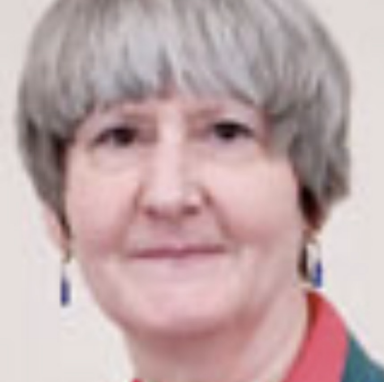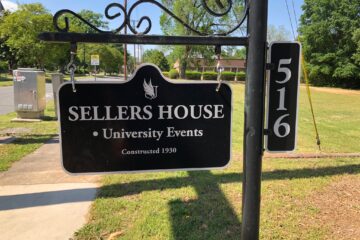Winthrop trustee Jane LaRoche called for the return of student and faculty representatives to the board of trustees table after changes to the board’s bylaws last summer revised representative rights and responsibilities.
LaRoche called the departure of representatives from the board table a “travesty” following the student and faculty reports to the board from student liaison Erin Emiroglu and faculty liaison Jennifer Jordan at the end of the April 8 meeting as a final, impromptu comment. Emiroglu and Jordan were seated with the public audience behind board Chair Glenn McCall.
In June 2021, the board of trustees, including LaRoche, unanimously approved a resolution to modify the language in the BOT bylaws that allotted positions for student and faculty representatives to the board.
The version of the board bylaws adopted previously in June 2018 said the board of trustees “may invite the Chair of the Faculty Conference and the designated leader of the officially recognized student representational organization to attend meetings of the Board as representatives of their respective organizations to the Board with the right to discuss but without a vote.”
In practice, the previous bylaws made the Faculty Conference chair and Council of Student Leaders president sitting members of the board who could not vote. Representatives would almost always be seated with the board of trustees and would have a nameplate denoting them to the public. Representatives were involved in public-closed executive sessions as non-voting members and served in a limited capacity on select board committees.
The bylaws approved in June 2021 include new language that allows for staff representation through the Staff Conference chair but mostly focuses on altering previously existing verbiage regarding student, faculty and staff representation. The 2021 language modifications shift away from representatives serving as default, non-voting board members and towards them serving as “liaisons” to the board who are called upon at the board’s convenience to speak on behalf of their organizations and report board activity back to their constituents.
“Liaisons may be invited to present to the Committees or full Board regarding special topics as needed. Liaisons are not members of the Board of Trustees. Therefore, they do not have a vote and are not permitted to attend the executive session of any Board of Committee meeting unless specifically invited by the Chair of the Board or Committee,” the bylaws approved in June 2021 read.
Secretary to the board of trustees Kimberly Faust said the board approved the new bylaws with the manifest goal of creating “meaningful ways for the students, faculty, and staff to support the work of the Board.”
“In previous iterations of the bylaws, students and faculty representatives were included,” Faust said. “However, there were no shared expectations of the roles nor a definition of how the representatives would assist and interact with the governing board. Consequently, the representative roles were ceremonial in nature, cumulated in generic verbal reports given while seated at the table during Board meetings, and were often comprised of information already known to the Board.”
Faust said that the board utilized last year’s bylaw review to address the role of students and faculty in relation to the board as well as include the staff perspective. The new liaison roles are the board’s solution and are meant to serve as active participants in creating recommendations “rather than being inserted at the end of the process in their ceremonial positions seated at the Board table.”
“Another misunderstanding with the representative role was that it was a conduit for making special requests directly to the Board and thereby bypassing the administrative hierarchy of the university. Winthrop has a well-developed set of organizations (CSL, Faculty Conference, Staff Conference,) protocols, policies, and procedures for student, faculty, and staff concerns, issues, and requests to be heard by the appropriate administrators. The Board will not undermine the authority of the president by receiving special requests that should be addressed by the campus Administration,” Faust said.
Staff liaison John Kroft said that he has not been able to fully take advantage of his role due to recent sickness and staff chair responsibilities taking precedent, but said that the one time he was able to attend a meeting, he was addressed and asked to speak about the staff community while minutes were being taken prior to the meeting’s adjournment.
“This is a colossal step in a good direction for Staff, but this is just the beginning for us as this is the first year we’ve been officially acknowledged in the Board’s bylaws. This has been something Staff has been working toward collectively since the Staff Assembly was first created two sitting university presidents ago. I have no doubt that Dr. Debbie Garrick, next year’s Staff Assembly Chair and Liaison to the Board will do a much better job at this than I have.”
Jordan, who was elected as faculty chair in April 2021, said that her experience as faculty liaison has been unproblematic so far and feels that her input has been valued by the board.
“I do feel like my voice is being heard. I am not sitting at the table during the meetings, but I have been asked several times for my input and at the last board meeting prior to the one Friday, the Board invited me to speak and I had the floor for over an hour. So the optics may seem that they are not interested in what we have to say, but that has not been my experience so far,” Jordan said.
Emiroglu, who is graduating this semester and will be succeeded by the recently elected president of CSL for the 2022-2023 academic year Miguel Caldwell, said she thinks it matters that representatives sit with the board and hopes it will create a conversation.
“Sitting alongside Board members allows for us to interact and communicate with more,” Emiroglu said. “Sometimes, board members don’t know how students, faculty, and staff feel about proposals or other business until after they’ve voted or made some decisions. I do think they want to hear from us, however, we don’t really have much time to interact with them until after the meeting.
“Dr. LaRoche has always been an activist for the Winthrop community. She’s willing to speak her mind for what she thinks is right and that’s pretty admirable. Unfortunately, her time on the board is coming to a close. She used this final opportunity to spark the conversation that needs to be had. I think more people agree with her than others realize.”
LaRoche’s term as Seat 13 on the board of trustees will end this year. She is one of the two trustees elected by the Alumni Association.




